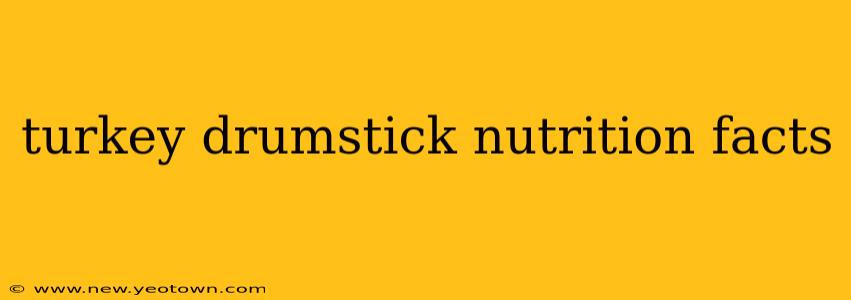The aroma of roasting turkey, a quintessential symbol of holidays and family gatherings, often fills our homes with warmth and anticipation. But beyond the delightful scent and comforting tradition lies a nutritional powerhouse: the turkey drumstick. This single piece of poultry packs a surprising punch of protein, vitamins, and minerals, making it a worthy addition to a balanced diet. Let's delve into the nutritional details of this festive favorite and address some common questions surrounding its nutritional profile.
What are the nutritional benefits of a turkey drumstick?
A single, average-sized turkey drumstick (approximately 4 ounces cooked) offers a significant amount of protein, crucial for building and repairing tissues. It's also a good source of several essential vitamins and minerals, including niacin, selenium, and phosphorus. Niacin plays a vital role in energy metabolism, selenium acts as a powerful antioxidant, and phosphorus contributes to bone health and energy production. The exact nutritional values can vary based on the size of the drumstick and how it's prepared (roasted, fried, etc.), but generally speaking, it's a nutritious and satisfying choice.
How many calories are in a turkey drumstick?
The calorie count of a turkey drumstick can fluctuate, depending on factors such as its size and the cooking method. However, a typical 4-ounce cooked turkey drumstick contains roughly 150-200 calories. Roasting is generally a healthier cooking method compared to frying, as frying can significantly increase the calorie and fat content. Remember to always check the nutrition information specific to the product and preparation method.
Is turkey drumstick high in fat?
Turkey meat, including the drumstick, is relatively lean compared to some other meats. However, the fat content can vary depending on the cut and the bird's overall fat percentage. The skin of the turkey drumstick contains a higher concentration of fat than the meat itself. Removing the skin before cooking significantly reduces the overall fat content, making it a healthier choice.
Is turkey drumstick good for weight loss?
A turkey drumstick can be part of a weight loss diet when consumed in moderation. Its high protein content promotes satiety, meaning you'll feel fuller for longer, potentially reducing overall calorie intake. However, it's crucial to be mindful of portion sizes and cooking methods to avoid excessive calorie consumption. Combining a turkey drumstick with plenty of vegetables makes for a well-rounded, weight-loss-friendly meal.
How much protein is in a turkey drumstick?
One of the most significant nutritional aspects of a turkey drumstick is its protein content. A typical 4-ounce serving provides approximately 25-30 grams of protein. This is essential for muscle growth and repair, making it a great choice for athletes and those striving to maintain muscle mass. This high protein content also contributes to that feeling of fullness, helping with appetite control.
What are the potential downsides of eating a turkey drumstick?
While generally healthy, consuming turkey drumsticks in excessive amounts can lead to a high intake of sodium, especially if heavily seasoned or prepared with salty broths. Individuals with specific dietary restrictions or allergies should also be mindful. For example, those with gout might need to limit purine intake, and the skin should be removed for those watching their fat intake. Always check the ingredient list for any potential allergens.
Conclusion: A Deliciously Nutritious Choice
The humble turkey drumstick offers a delicious and nutritious option for a balanced diet. Rich in protein, essential vitamins, and minerals, it deserves its place on the holiday table and beyond. By being aware of the nutritional information and choosing healthy preparation methods, you can enjoy this festive favorite without compromising your health goals. Remember to always consult a doctor or registered dietitian for personalized dietary advice.

